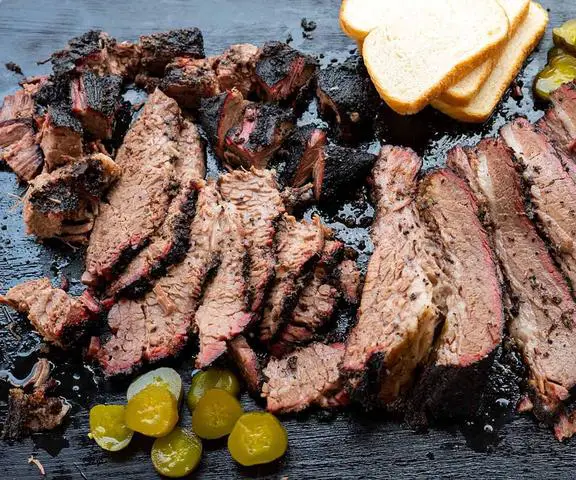
“Unlock the secret to mouthwatering brisket with our best brisket rub for ultimate bark. Elevate your BBQ game with our expertly crafted blend of spices and seasonings, perfect for creating a tantalizing crust that seals in flavor and showcases a rich, smoky bark. Impress your guests with tender, juicy bites that are sure to leave them craving more. Get ready to achieve BBQ perfection every time with our unbeatable brisket rub.”
Best Brisket Rub for Bark: As Simple as 3 Ingredients
A lot goes into making good brisket; from selecting the right brisket, trimming properly, to smoking, to wrapping (or not), and resting. Something that tends to get glossed over is the bark and the spices role in promoting a better bark.
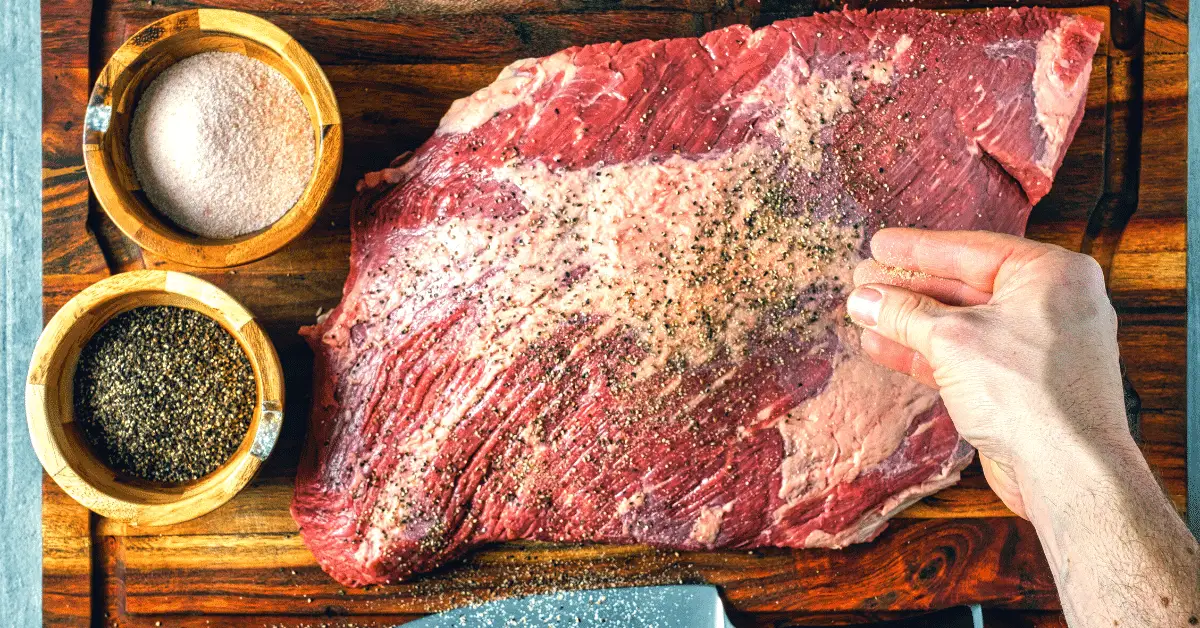
In my opinion, the best brisket rub for bark is 1-2 Tablespoons of Morton’s Kosher salt, 1-2 Tablespoons of freshly cracked black peppercorns, and 1 Tablespoon of garlic powder; All the above is per side. With that said, I’m still a huge fan of using ingredients like 16 mesh black pepper and Lawry’s seasoned salt (more on these below).
To start with, something that a lot of people do with Barbecue – whether we’re talking brisket or any other cut of meat – is they borderline assault the meat with spices. In some cases it’s to the point where you’re tasting more rub than you are the meat and its own intrinsic flavor. It also doesn’t help that these days most of the people teaching you how to smoke brisket are also Barbecue Competitors.
In my opinion, there is a huge difference between backyard barbecue and competition barbecue. Competition barbecue is about attacking the taste buds of Judges. Backyard barbecue is about creating flavor that makes you want to eat more.
Competition brisket involves a number of things, namely: The bark on brisket is the dark exterior crust that forms on the meat. The bark is a byproduct of chemical reactions; Namely the Maillard reaction and polymerization that results in the pellicle. The Maillard reaction is a chemical reaction between the amino acids (proteins) and sugars – in and on food – and is transformed by heat. The result are new flavors, aromas, and color; People will often refer to the maillard reaction as a “browning.”
Another chemical process that’s worth mentioning is polymerization. This process results in the jerky-like pellicle (From the Latin pellicula, meaning skin) on the exterior. Without any smoke the bark would turn a deep mahogany color. However, when smoke is introduced, the resulting color is a deep black. Essentially, we get browning from the maillard reaction of amino acids and reducing sugars, a jerky-like thin pellicle, and a deep black color from the hardwood smoke.
Combining the above with rendered fat and we get a black velvet-like sheen. This rendered fat also has the added benefit of holding onto spices like coarse ground pepper (more on that below) which works to create a “crunchy” bark. This is the reason coarse ground pepper is best applied first as apposed to last.
Of the different ingredients, the one that matters the most in terms of bark formation is pepper. The main things to understand are “mesh” sizes and the effect of freshly cracked peppercorns vs ground pepper. There’s also the concept of different types of peppercorns. However, for all intents and purposes – most people use black pepper; I’m personally a big fan of purple peppercorns with brisket.
After following enough brisket articles or watching enough brisket recipe videos, you’ll hear the person mention the word “mesh.” The term mesh simply refers to the coarseness of ground pepper. It also quite literally refers to the size of the holes in the mesh screen the spice passes through while it’s being ground.
Mesh size is important for creating spice blends – even for something like a brisket rub. The most commonly referenced “mesh” size for brisket is 16 mesh black pepper. Based on the above list, it’s somewhere between coarse and table ground.
Something that I wanted to harp on is that there is a huge difference between freshly cracked peppercorns and pre-ground, 16 mesh black pepper. The flavor from both forms comes from compounds like: Freshly cracked peppercorn has less surface area so these compounds don’t evaporate quickly. Conversely, something like 16 mesh has a greater surface area meaning a higher rate of evaporation.
Put simply, freshly cracked peppercorns are stronger or more pungent than 16 mesh black pepper. The only reason I bring this up is because if your recipe calls for an excessive amount of 16 mesh black pepper, I wholeheartedly advise against substituting the same amount of freshly cracked black peppercorns. I personally love freshly cracked peppercorns – while you can’t use nearly the same amount as you can with 16 mesh, it adds a quick pop of pungency in your bite.
With freshly cracked peppercorns, you need maybe 1-2 tablespoons for both sides of a 7-12 lb brisket. Where-as with 16 mesh black pepper you can be super aggressive; The result is an almost “crunchy” exterior that gets formed. This combined with the pellicle on the surface of the meat creates a different mouth-feel that’s pleasurable. Maybe a better option would be a mixture of both 16 mesh for the crunchy bark and a tablespoon of freshly cracked peppercorns for a pop of flavor?
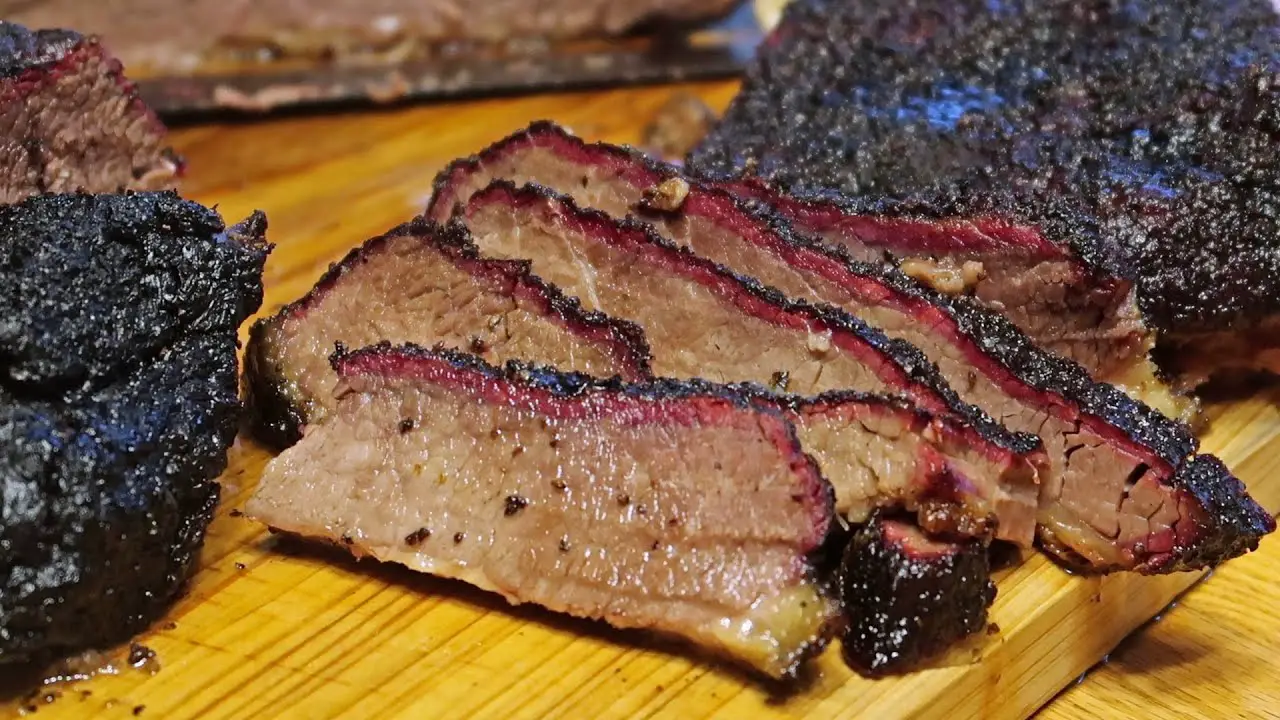
The next thing to bring up is salt. Almost every beef recipe – whether it’s brisket, steak, ribs, etc. will use salt in the seasoning. Salt is used because it enhances the natural “beefy” flavor of the meat.
The main thing to talk about in terms of salt is the type of salt you’re using (table vs kosher salt) and the brand. In the barbecue community literally every single concept is an argument; No joke – people even argue about the right brand of salt to use.
Elitist’s will say to use Diamond Crystal Kosher Salt because it features a singular ingredient – kosher salt. Where-as people who don’t taste a difference – like Me – will use Morton’s because it’s cheaper – and I mean much cheaper. I typically source my Ingredients from Walmart.
As of updating this article (2/22/2023), Walmart has the following prices for Kosher Salt:
- Morton’s Kosher Salt, 48 oz: $3.98
- Diamond Crystal Kosher Salt, 48 oz: $6.97
The reason the Elite don’t like using Morton’s is because it features an anti-caking agent (yellow prussiate of soda, or sodium ferrocyanide). Where-as Diamond Crystal is just kosher salt.
In my humble opinion, for a person who does backyard barbecue, this doesn’t matter; You aren’t going to taste a difference. However, something that does matter is knowing how the brands can affect the “saltiness” of your food.
In my recipes on BarbecueFAQ I specify that I use Morton’s Kosher salt – as apposed to just “kosher salt.” If in a recipe for brisket you see someone use a significant amount of Diamond Crystal, you cannot substitute equal parts Morton’s. This is because Morton’s is denser than Diamond Crystal. If the recipe didn’t specify, you’d either have an over-salted or under-salted meal; Personally I’d rather have something under-salted than over-salted.
I have a way more in depth article on this topic, found here. In it I look at the density of the salt, cost, and even why Diamond Crystal is technically better for making dry rubs (like for brisket).
This sort of begs the question – what about regular table salt? The reason I brought up the brands first is because it helps to transition into the reason why table salt is problematic: There is also the fact that the grain size of kosher salt and table salt are much different; It’s in a similar vein to pepper mesh sizes. Kosher salt is coarse where-as table salt is fine. The coarse grains will salt your food in a way that enhances the flavor of the food. Conversely, table salt will simply make the food taste “salty.”
There’s also the concept of iodized vs non-iodized salt. Morton’s and Diamond Crystal kosher salt aren’t iodized where-as some table salts are. Some folks find that iodized salt has a bitter after-taste.
Truly, all that’s needed to make a good brisket is Kosher Salt and Pepper. Aside from those two ingredients it comes down to personal taste preferences. Typically I’ll just stick to Morton’s Kosher Salt, Freshly cracked peppercorns, and garlic powder.
Lawry’s seasoned salt has become super popular in the Barbecue community because of Johnny White from Goldee’s Barbecue – which was recently voted as the number 1 barbecue joint in Texas by Texas Monthly. Johnny White used to work for Franklin’s Barbecue which is world renowned for their brisket.
Aaron Franklin is someone who has harped on just using “salt and pepper,” which I totally agree with. Barbecue has long been something people have been secretive about and that even includes things like rub ingredients. Recently though, when Aaron was asked about Lawry’s he actually admitted that they’ve used it.
With that said, I think Aaron’s comment – “you don’t have to have a complicated rub to make great barbecue” is true. Something as simple as Kosher salt and Pepper make wonderful bark on a brisket. The use of other spices is simply personal preference.
Backyard Barbecue Brisket vs Competition Brisket

When it comes to brisket, there is a distinct difference between backyard barbecue and competition barbecue. Backyard barbecue focuses on creating flavors that make you want to eat more, while competition barbecue aims to assault the taste buds of judges.
Competition brisket involves various techniques and elements, including creating a flavorful bark on the meat. The bark forms as a result of chemical reactions such as the Maillard reaction and polymerization. These reactions create new flavors, aromas, and colors on the exterior crust of the meat.
In contrast, backyard barbecue brisket is about enhancing the natural flavor of the meat while still achieving a delicious bark. It doesn’t require excessive amounts of spices or aggressive seasoning. Instead, it relies on simple ingredients like kosher salt, freshly cracked black peppercorns, and garlic powder to enhance the flavor without overpowering it.
What is the Bark on Brisket?
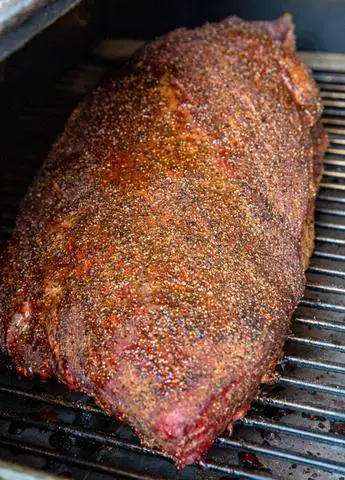
The bark on brisket refers to the dark exterior crust that forms on the meat during the smoking process. It is a result of chemical reactions, specifically the Maillard reaction and polymerization. The Maillard reaction occurs when proteins and sugars in food are transformed by heat, resulting in new flavors, aromas, and color. This reaction is often referred to as “browning.” Polymerization, on the other hand, creates a jerky-like pellicle on the exterior of the meat. When smoke is introduced during the smoking process, it adds a deep black color to the bark. The rendered fat from the meat also contributes to a black velvet-like sheen on the bark.
Let’s Talk Pepper
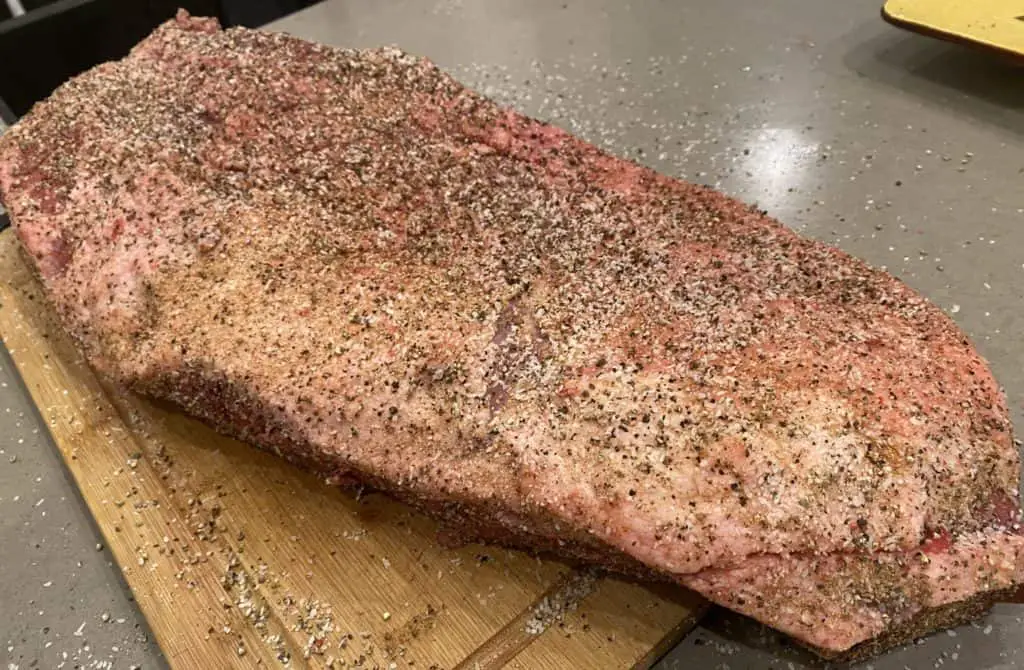
When it comes to creating a flavorful bark on brisket, pepper plays a crucial role. The type and size of the pepper used can greatly affect the taste and texture of the bark. One important concept to understand is the difference between freshly cracked peppercorns and pre-ground, 16 mesh black pepper. Freshly cracked peppercorns have less surface area, resulting in a stronger and more pungent flavor compared to 16 mesh black pepper. It is important to note that if a recipe calls for a large amount of 16 mesh black pepper, substituting the same amount of freshly cracked peppercorns may result in an overpowering flavor.
For creating a crunchy exterior and enhancing the mouth-feel of the brisket, many barbecue enthusiasts recommend using coarse ground pepper like 16 mesh. This type of pepper works well in combination with the jerky-like pellicle formed on the meat’s surface during smoking. Some people also enjoy adding a tablespoon of freshly cracked peppercorns for an additional burst of flavor.
Salt is another essential ingredient for seasoning brisket and enhancing its natural beefy flavors. The choice between table salt and kosher salt can significantly impact the taste and overall outcome of your brisket. Kosher salt, with its coarse grains, adds flavor enhancement to the meat, while table salt may simply make it taste salty.
There is also a debate about which brand of kosher salt to use – Morton’s or Diamond Crystal. Elitists tend to prefer Diamond Crystal because it contains only kosher salt without any additives. However, many backyard barbecue enthusiasts find no significant difference in taste and opt for Morton’s due to its affordability.
It is important to note that Morton’s kosher salt is denser than Diamond Crystal, so substituting equal parts of these brands in a recipe may result in under- or over-salted meat. Understanding the differences in brand, density, and grain size can help you achieve the desired level of saltiness in your brisket.
Pepper Mesh Size
The term “mesh” refers to the coarseness of ground pepper. For brisket, the most commonly referenced mesh size is 16 mesh black pepper, which falls between coarse and table ground. This size is ideal for creating a spice blend that adds flavor and texture to the bark.
There is a significant difference in flavor between freshly cracked peppercorns and pre-ground, 16 mesh black pepper. Freshly cracked peppercorns have less surface area, resulting in slower evaporation of flavor compounds. On the other hand, 16 mesh black pepper has a greater surface area, leading to a higher rate of evaporation. While both forms of pepper can be used in a brisket rub, it’s important to adjust the quantities accordingly due to their differing potency.
Salt is essential in beef seasoning as it enhances the natural flavor of the meat. When it comes to selecting salt for a brisket rub, there are two main options: kosher salt and table salt. Kosher salt has coarse grains that enhance the flavor of food, while table salt has fine grains that simply make food taste salty. Additionally, some table salts are iodized and may have a bitter aftertaste. In terms of brand preference, Morton’s Kosher Salt is more affordable compared to Diamond Crystal Kosher Salt but contains an anti-caking agent that some consider undesirable. Ultimately, choosing between kosher salt brands depends on personal taste preferences and recipe specifications.
Lawry’s seasoned salt has gained popularity in the barbecue community due to its use by renowned pitmasters like Johnny White from Goldee’s Barbecue. While simple rubs consisting of just kosher salt and pepper are sufficient for creating great bark, Lawry’s seasoned salt can add additional flavor elements to the brisket.
Freshly Cracked Peppercorns vs Pre-ground Pepper
Freshly Cracked Peppercorns vs Pre-ground Pepper:
Freshly cracked peppercorns and pre-ground pepper are two different forms of black pepper that can be used in brisket rubs. The main difference between the two lies in their flavor profile and potency.
Freshly cracked peppercorns have less surface area compared to pre-ground pepper, which means that their flavor compounds don’t evaporate as quickly. This results in a stronger and more pungent flavor when using freshly cracked peppercorns. However, due to its potency, you would need less of it compared to pre-ground pepper.
On the other hand, pre-ground pepper, specifically 16 mesh black pepper, has a greater surface area due to its finer grind. This leads to a higher rate of evaporation and a milder flavor compared to freshly cracked peppercorns. However, it is still commonly used in brisket rubs because it creates a crunchy exterior when combined with the pellicle on the meat’s surface.
Both forms of black pepper have their own benefits and can be used depending on personal preference. Some people prefer the quick pop of pungency that freshly cracked peppercorns provide, while others enjoy the crunchy texture that pre-ground pepper adds to the bark. A combination of both can also be used for a balance of flavor and texture in the brisket rub.
Let’s Talk Salt
In the world of brisket rubs, salt plays a crucial role in enhancing the natural flavors of the meat. When it comes to selecting salt for your rub, there are a few factors to consider. The two most commonly used types of salt are table salt and kosher salt.
Kosher salt is often preferred in barbecue recipes due to its coarse grain size, which helps to enhance the flavor of the meat. It also does not contain additives like iodine, which can sometimes leave a bitter aftertaste. Two popular brands of kosher salt that are commonly used in barbecue recipes are Morton’s Kosher Salt and Diamond Crystal Kosher Salt.
There is some debate among barbecue enthusiasts about which brand of kosher salt is best to use. Elitists argue that Diamond Crystal Kosher Salt is superior because it contains only one ingredient – kosher salt – without any anti-caking agents. On the other hand, those who do not notice a significant difference in taste may opt for Morton’s Kosher Salt due to its lower price point. It’s important to note that Morton’s Kosher Salt is denser than Diamond Crystal, so if a recipe calls for a specific amount of one brand, it may not be suitable to substitute with an equal amount of the other.
Morton’s Kosher Salt vs Diamond Crystal Kosher Salt
When it comes to choosing between Morton’s Kosher Salt and Diamond Crystal Kosher Salt, there are a few factors to consider. One of the main differences is the presence of an anti-caking agent in Morton’s salt, which some people prefer to avoid. Diamond Crystal, on the other hand, contains only kosher salt without any additives.
Another factor to consider is the density of the salt. Morton’s Kosher Salt is denser than Diamond Crystal, so if a recipe specifies one type of salt and you substitute with the other, it can affect the overall saltiness of the dish. It’s important to use equal parts when substituting these salts to avoid over- or under-salting your food.
In terms of cost, Morton’s Kosher Salt tends to be cheaper than Diamond Crystal. However, taste-wise, many people cannot notice a significant difference between the two brands when used in cooking or seasoning meats like brisket.
Table Salt vs Kosher Salt
Table salt and kosher salt are two common types of salt used in cooking, including in barbecue recipes. However, there are some differences between the two that can affect the flavor and overall outcome of your dish.
One major difference is the grain size. Table salt has a fine texture, while kosher salt has larger grains that are more coarse. This difference in grain size can impact how the salt distributes and interacts with the food. Kosher salt’s larger grains tend to adhere better to meat, providing a more even and enhanced flavor compared to table salt.
Another distinction is the presence of iodine. Some table salts are iodized, meaning they have been fortified with iodine for nutritional purposes. On the other hand, both Morton’s Kosher Salt and Diamond Crystal Kosher Salt do not contain iodine. Some people find that iodized salt can have a slight bitter aftertaste, so using non-iodized kosher salt may be preferred for those seeking a purer salt flavor.
Additionally, density is another consideration when choosing between table salt and kosher salt. Morton’s Kosher Salt is denser than Diamond Crystal Kosher Salt, meaning that you need less Morton’s to achieve the same level of salinity as Diamond Crystal. If a recipe specifies one type of kosher salt but you only have access to another brand or type, it’s important to adjust the amount accordingly to avoid over-salting or under-salting your dish.
In conclusion, while both table salt and kosher salt can be used in cooking and barbecue recipes, there are some differences to consider. The larger grain size and absence of iodine in kosher salts like Morton’s or Diamond Crystal can provide a better distribution of flavor on meat, while density variations may require adjustments in measurements when substituting one for another in recipes. Ultimately, personal preference plays a role in determining which type of salt to use.
Other Ingredients
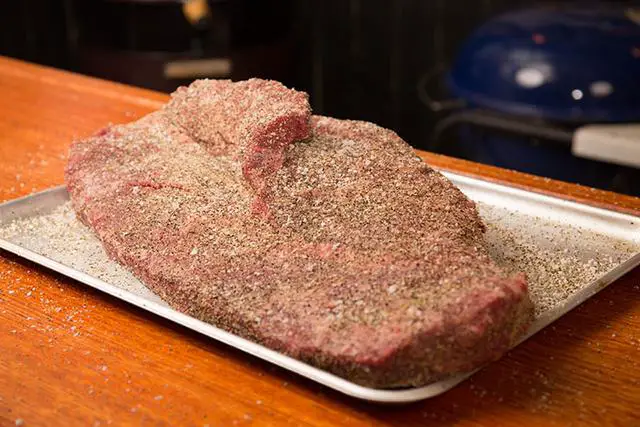
Aside from kosher salt, black peppercorns, and garlic powder, there are other ingredients that can be used to enhance the flavor of the brisket bark. Some popular options include:
- 16 mesh black pepper: This coarse ground pepper adds a crunchy texture to the bark when combined with rendered fat.
- Purple peppercorns: These peppercorns can add a unique flavor profile to the brisket.
- Lawry’s seasoned salt: This popular seasoning blend, made famous by Goldee’s Barbecue in Texas, can be used in addition to or instead of kosher salt for added flavor.
- Spicy elements: Cayenne pepper, chili powder, and other spices can be added for a kick of heat.
- Umami elements: Ingredients like mushroom powder, dashi, and MSG can enhance the savory flavors of the brisket.
- Piperine: This alkaloid compound found in black pepper is responsible for its pungency.
- Terpenes: These compounds give plants their distinct aromas and can contribute to the overall flavor of the brisket bark.
- Injecting with beef broth or specially formulated ingredients: Injecting the brisket with beef broth or other ingredients like salts and phosphates can help keep it moist and add flavor during cooking.
It’s important to note that while these additional ingredients can enhance the flavor of the bark, they are not necessary for creating a delicious brisket. The combination of kosher salt and black pepper alone is enough to create a flavorful bark on its own. The use of other spices is simply a matter of personal preference. Experimentation with different ingredients can help you discover your own unique blend for creating the perfect brisket bark.
In conclusion, finding the best brisket rub for a flavorful bark is essential to achieving mouthwatering results. Experimenting with different combinations of spices, sugars, and seasonings can help you discover your preferred taste. Remember to consider personal preferences and adjust accordingly for a perfectly seasoned and delicious brisket.
Learn More About Grilling
If you want to learn more about grilling, check out these other helpful resources!







